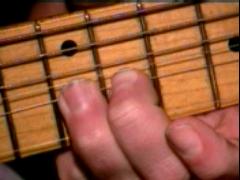
Michael:
We're going to cover more drone string techniques in the style of grunge, our first file is a walking bass line in E:
Michael:
Here's the E minor scale on the little string E
Michael:
you can also play this pattern on the 2nd string B, but it's called a different name,
the E minor scale has E, F#, G, A, B, C, D, there is also a pattern you can play on the 2nd B string,
it's relative to the first scale, does anybody know what the term "relative" means in the context of scales?
Ed:
sorta, but I don't know how to describe it
pam:
Em is relative to the key of G
Michael:
good
George:
Same notes in a different key
pam:
Gmaj is the scale and the relative minor is the sixth scale tone
Rick:
the 4 of maj is rel min?
Michael:
in short they are a group of scales that consist of the same notes only different order
lyleANDmarshall:
the tearm relative means same notes different root
Michael:
that's the 6th scale rick, here's an example
E, F#, G, A, B, C, D
pam:
So in the key of G major the relative minor is em
Chris:
G is relative because of the shared f#?
Michael:
yes Chris, if we were going to play those exact notes starting from the B what order would you have?
pam:
B C D E F# G A
Michael:
YES! here's the scale, B Dorian is the name for it
Michael:
we can combine playing the low E string then play two notes at a time on the 1st and 2nd string using the last scale
Chris:
Ok I have one small question -> the scale modes are just different starting positions within a scale?
Michael:
yes Chris, notice how you play on the low E then the lick climbs using the B scale and the little E is played open,
also try playing this lick to the jam track, if you remember how to play the B Dorian scale you can make up your own licks,
try playing that lick then playing the B Dorian scale also bend the last note with your 2nd and 4th fingers,
here's a picture of me bending
Bend Technique

Michael:
see how the 2nd finger supports the 3rd
Ed:
it's hard to not mute the e string when I do this
Michael:
yes it is, this lick uses the same scale but starts on the 12th fret
john:
Dorian Scale = Natural Minor with raised 6th, right?
Michael:
yes john
mike:
how are you getting that tone?
Michael:
I'm using a Tele in the middle pickup through a SansAmp
john:
Then it could be viewed as adding a sharp (or removing a flat) from the key signature, yes? Moving round the circle of fifths...? (light bulb goes on in my head)
Michael:
john that's one way of looking at it or you can refer to the pattern from the main major (Ionian) scale
john:
like it was the ii scale, played perhaps as part of a ii-V-I turnaround?
Michael:
could be john, I like the sound when played over the jam track
Ed:
is grunge always in Dorian mode?
Michael:
no, I don't think there's any set mode, most grunge players play by feel or sound,
but actually they are playing in all kinds of creative modes and not even knowing it.
It's like Jimi Hendrix, he had no idea technically what he was playing, but MAN, he did it!
Chris:
they are art in a fluid sonic state
justus:
i have a question about a scale...
Michael:
sure
justus:
if im gettin ready to do a lead, solo, etc, and i go towards the bottom of the neck, which scale should i use,
allot of them use the same notes???
Michael:
yes, good question, do you all want me to send you some examples? Here's a scale you can play over the jam track,
this is low E min pentatonic. Pentatonic meaning 5 notes in the scale
justus:
cuz ya know teach, if i know i wanna play around the 12-15 frets, which scale should i use, because several scales have similar notes, etc
justus:
its just kind of overwhelming, and i don't want to get stuck using the same scale over and over on a jam...
Michael:
here's the next scale, you have 2 octaves you can play in
Chris:
is this a Major or Minor Pentatonic?
Michael:
Minor pentatonic in this case
justus:
min pent....
Michael:
do you want to try a lick using that pattern in the open position?
Chris:
what is the difference between the two?
Michael:
it's actually using the B Dorian also
Michael:
it's a combination of the scales, see how that combination of notes creates a darker type sound
George:
Teach, do you use all down strokes for that last riff
Michael:
yes, now let's combine the relative scales on the 1st and 2nd strings, the first scale is E minor on the first string and the second is the relative B Dorian on the 2nd string
Skedman: That's cool with alternating triplets.
Michael:
let's try combining the last 2 scales together, here they are played at the same time on the 1st two strings
Michael:
any journey starts with one step, learn the scale a bit at a time and that understanding builds over time,
whoops the last note shouldn't be there, it should be C
justus:
ok, im pretty creative at coming up with little ditties, licks, etc...so i have a little
something going...how do i know which scale to use to build or expand their rest of the jam?
Skedman:
It has a Joe Walsh feel to it.
lyleANDmarshall:
uh it depends on which chords you use there big guy
justus:
really lyle?
Michael:
always find the root note or key of a jam
justus:
yes but a G maj, and a min pent can have almost the same patterns, no?
lyleANDmarshall:
really justice, and this is lyleANDmarshall (marshall speaking)
Michael:
then find out if it's based on a Minor (b3) or Major (3) scale, that's a good clue to understand how to play in the correct scale,
yes justus, it depends though on what the chording is
Ed:
Gmaj chord is different than the Gmin pent scale, if that's what you're asking Justin
Gigi:
The B Dorian scale makes me think of the second degree of the A major scales. I am a bit lost.
justus:
so lets say i have a song...prog is c Em Gmaj7 Am....what would sound goog as a lead over it?
Michael:
the notes on the bottom tiring are based on relative maj and min 3rd intervals in the last two scales I sent,
correct Gigi
justus:
yeah..thats the style i play tho so i get confused or lost on which scale to use..
lyleANDmarshall:
id have to say a c major justus
Michael:
justus establish what the KEY is first, in your case E Minor is the KEY
justus:
it is??? not C?
Michael:
so you can play the E minor scale
lyleANDmarshall:
yea that's true to because you have an f# there
lyleANDmarshall:
sorry man
justus:
i thought if the song starts in key C that would be the key.. hmm?
justus:
its kewl lyle..i appreciate all your support,
lyleANDmarshall:
its hard in that case because you have both minor and major chords in there
lyleANDmarshall:
and its actually marshall typing
lyleANDmarshall:
the major and minor chords can work sometime though
justus:
hehe..sory marsh....i give u props..lol
Michael:
you can have the song be based on the Major or Minor KEY
lyleANDmarshall:
like a good example is light my fire by the doors
Michael:
yep, well hey everybody it's time to go
lyleANDmarshall:
it has a minor chord thrown in over major chords
|
<< load notation from left
|